Puran Poli Recipe
My delightful Puran Poli recipe with step-by-step photos will show you how to make the traditional Indian treat. This lentil stuffed sweet flatbread is a popular Maharashtrian recipe made during Ganesh Chaturthi, Diwali, Holi or any other festive occasion. While it does take a bit of skill and patience to make, the results are well worth it! And as an added bonus, this sweet recipe also happens to be pretty darn nutritious, meaning you can even eat it for breakfast.
About Puran Poli
Puran Poli is a flatbread stuffed with a sweet lentil stuffing. In Marathi language the sweet stuffing is known as Puran, and the flat bread is called Poli. While puran poli is considered a sweet, the ingredients make it quite healthy.
There are a few variations of this delish flatbread found in the Western and Southern parts and regions in India.
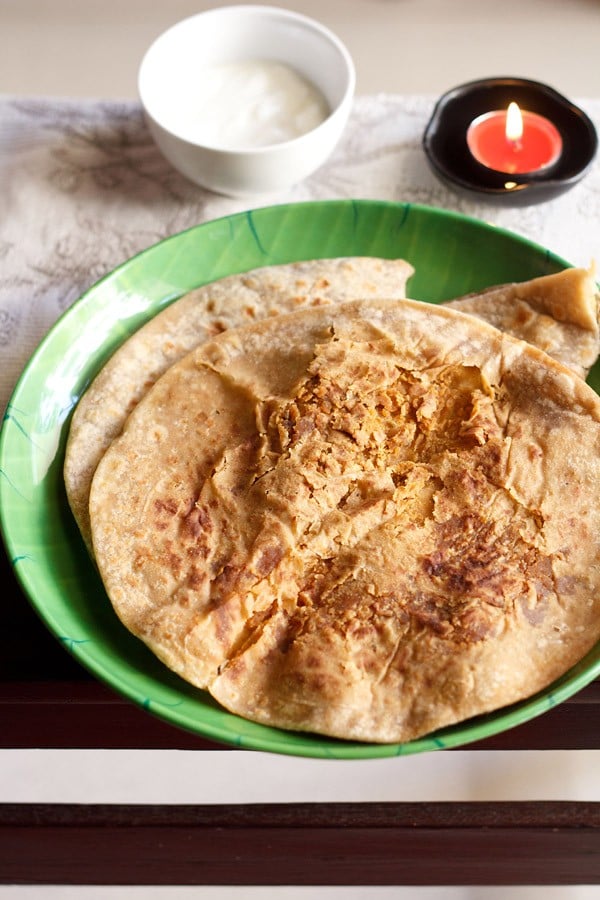
A similar variation in South India and from the Andhra and Karnataka cuisine is called Bobbatlu or Obbattu or Holige, where the proportions of flours may vary together with the kind of flavoring spices and lentils used.
In the authentic Maharashtrian Puran Poli recipe, the stuffing is made from chana dal (also known as bengal gram) which are husked and split black chickpeas.
The cooked chana dal lentils are sweetened with jaggery and spiced with cardamoms, fennel, nutmeg and ginger. The chickpeas are full of protein, fiber, folate and vitamins.
The poli (flatbread) is made from a mix of whole wheat flour (atta) and all purpose flour (maida). Whole wheat flour is also chock full of fiber, protein and minerals.
If you prefer a yellow colored flatbread, you can add some ground turmeric powder in the dough, which would add some anti-inflammatory power to these treats.
So if you are someone who has a naughty sweet tooth but are trying to be nice to your body, try making this delicious dessert that you truly can feel good about.
Making Puran Poli recipe is easy, but it takes time. Be sure to plan in advance before making it. Feel free to prepare the sweet stuffing a day or two before and refrigerate it.
This way you can break up the process into more easily achievable bites. The following day, make the dough, shape the poli and pan fry them. Easy peasy!
About Jaggery
Jaggery is an unrefined sugar that is easily available in India. If you live outside India, then check for jaggery in asian or Indian grocery stores or on Amazon.
Jaggery has a lower glycemic index than sugar, and also contains vitamins and minerals that are beneficial to health.
Note: If you are unable to procure jaggery, check for Mexican piloncillo, Latin American panela or muscovado sugar, all of which are similar.
How to make Puran Poli
Cook Chana Dal
1. Rinse 1 cup of chana dal very well in water. I didn’t soak the chana dal, but you can soak the chana dal for 30 minutes to one hour and then drain the water.
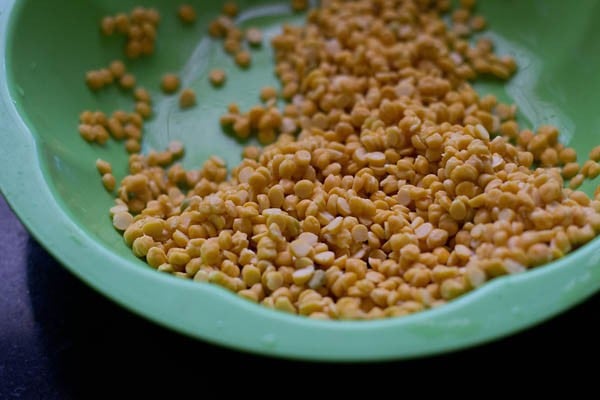
2. In a 3 litre stovetop pressure cooker, cook the chana dal with 3 cups of water for 6 to 7 whistles on medium heat. The dal need should not be mushy or pasty but cooked tender and softened.
Allow the pressure to release naturally in the cooker, then strain the cooked dal. Keep the dal in the strainer for several minutes so that all the stock is drained. The cooked lentils have to be drained very well.
Tip: Keep the lentil stock aside. It can be used for making Katachi Amti (thin spiced dal) or you can just add it to your veggie dishes or roti dough.
Note that you can also cook the lentils in an Instant Pot or in a pan/pot on the stovetop. If cooking lentils in a pot on the stovetop, make sure to soak them for an hour or two.
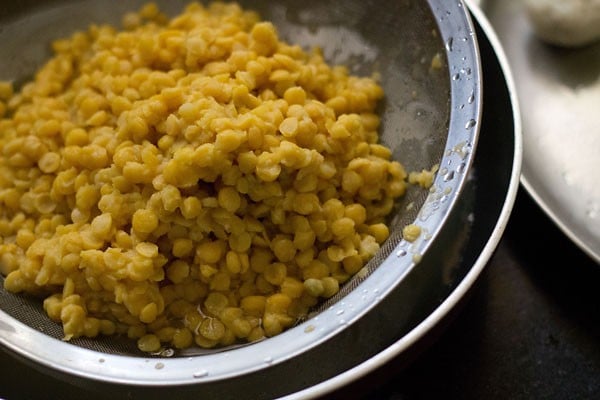
Make Puran (Lentil Filling)
3. Lightly heat 2 teaspoons ghee in a pan (keeping heat to a low) and add the following ground spices:
- ¾ to 1 teaspoon dry ginger powder (ground ginger)
- ¼ teaspoon nutmeg powder
- ½ teaspoon green cardamom powder
- 1 teaspoon fennel powder
Fry for a few seconds on low heat; this will help the natural oils in the spices to awaken and taste more flavorful.
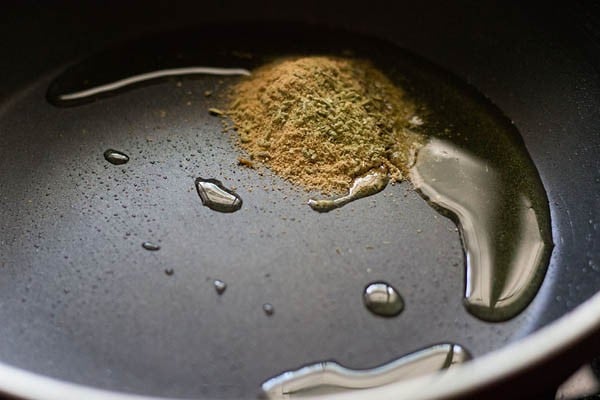
4. Add the cooked chana dal and 1 cup of powdered or grated jaggery. Stir and let the puran mixture cook on a low heat till the mixture becomes dry, stirring at intervals.
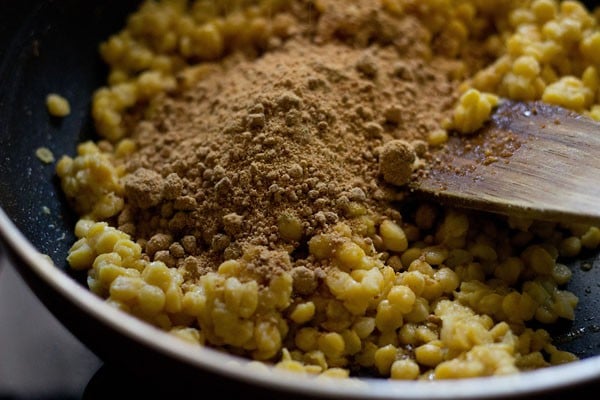
8. The puran mixture has cooked now and the below photo shows the thick, dry consistency you should have. Let this stuffing mixture cool.
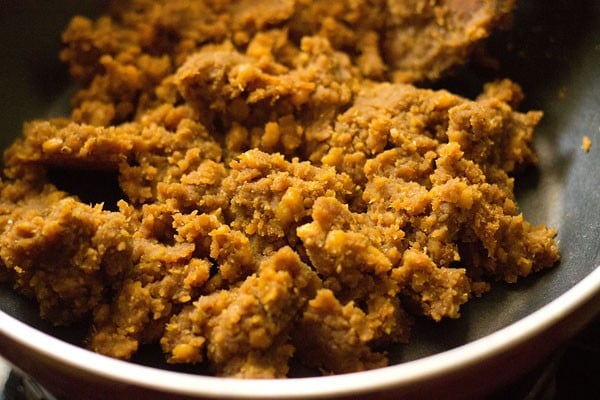
9. Now mash the puran mixture very well with a potato masher or strainer. You need to mash the lentils thoroughly as the whole pieces of lentils may cause the dough to crack or tear while rolling.
Note: There is a piece of equipment called ‘puran yantra’ which is used in Maharashtrian households to do this work, but I do not have this equipment. In America, the puran yantra would be considered very similar to a food mill.
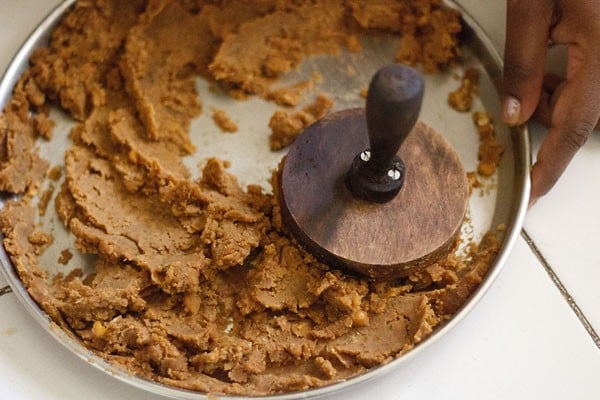
Make Poli (Flatbread) Dough
5. Meanwhile while the sweet lentil filling is cooling, prepare your dough to make the outer cover or poli.
Take 1.5 cups whole wheat flour, 1 cup all-purpose flour and ½ teaspoon salt in a bowl. Mix well.
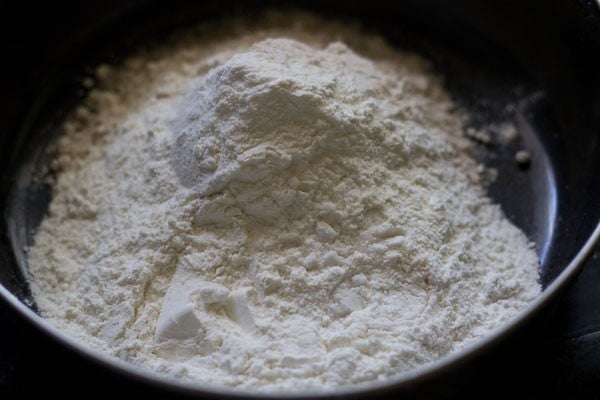
6. Add a little bit of water and 4 tablespoon ghee or oil and mix.
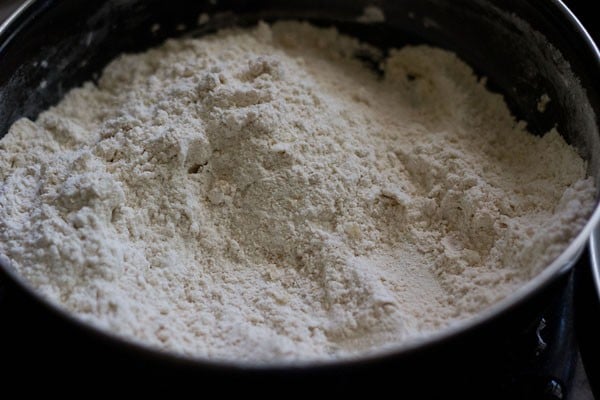
7. Begin to knead the dough, adding water as required. The dough should be smooth, supple and soft. Cover and rest the dough for 15 to 20 minutes.
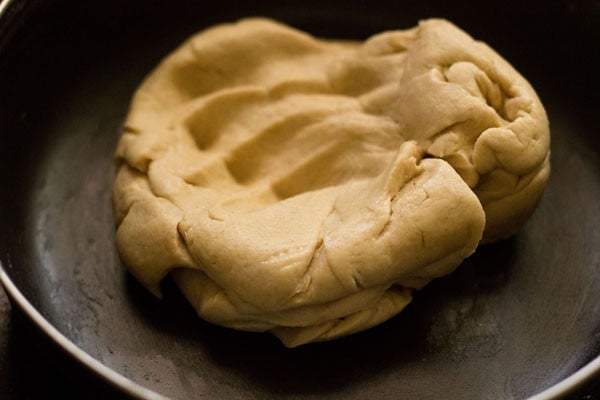
Assemble and Roll
10: Take a medium or large size ball from the dough. With a rolling pin, roll it 2 to 3 inches in circumference on a dusted rolling board. Place a portion of puran mixture in the center of the rolled dough.
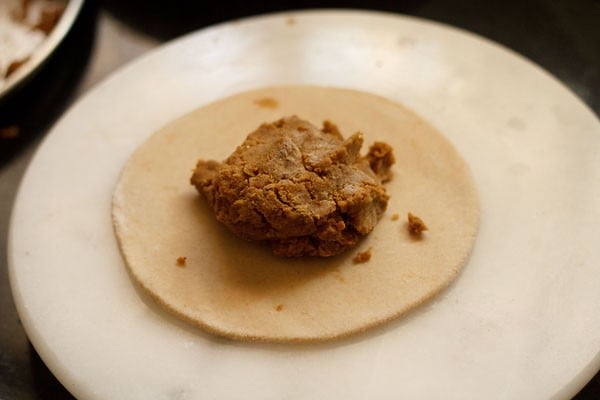
11. Bring the edges together towards the center as shown in the below pic.
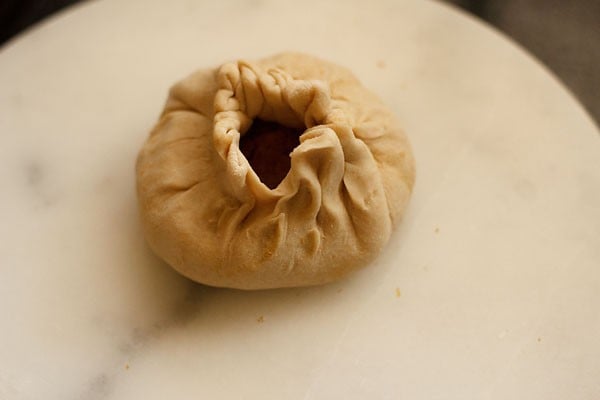
12. Join all the edges and pinch them as shown in the picture below.
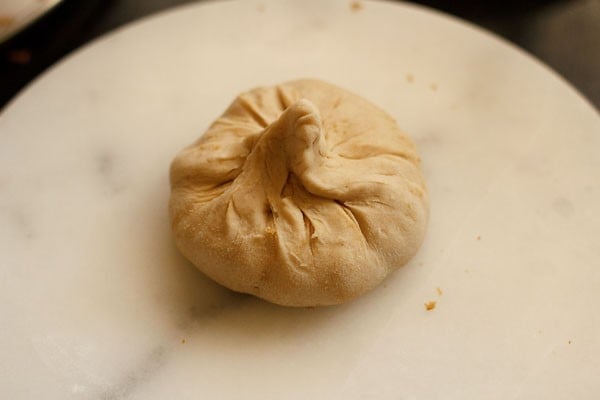
13. Sprinkle some flour and start rolling the dough.
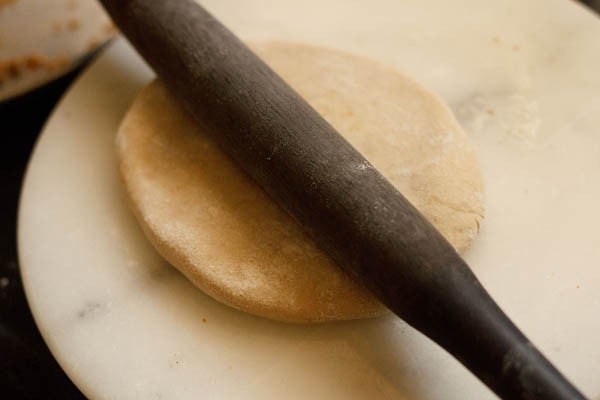
14. Make a medium or large circle (poli) as depending upon the size of the dough and puran filling you took. The cover should be rolled rather thin, so you can almost see the filling beneath it.
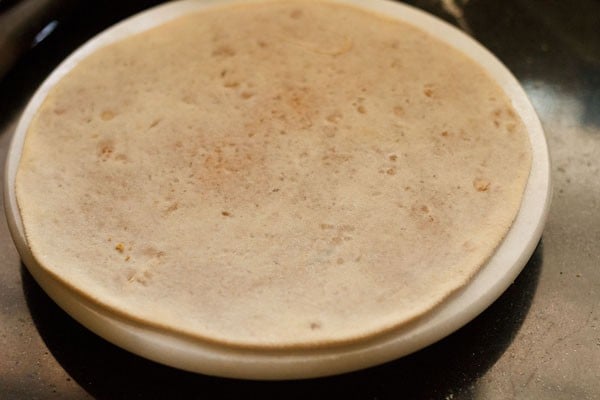
Roast Puran Poli
15. On a heated tawa or griddle, spread some ghee.
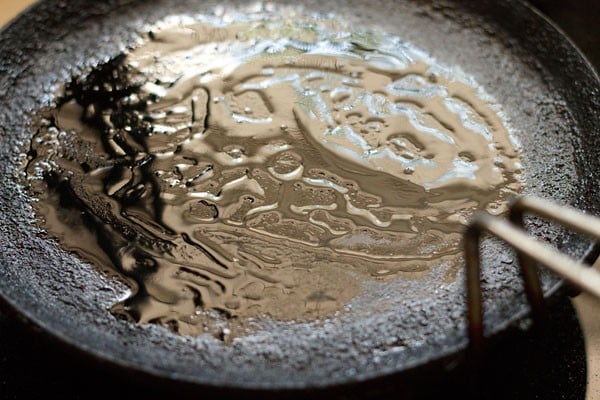
16. Place the rolled poli/dough circle on the tawa.
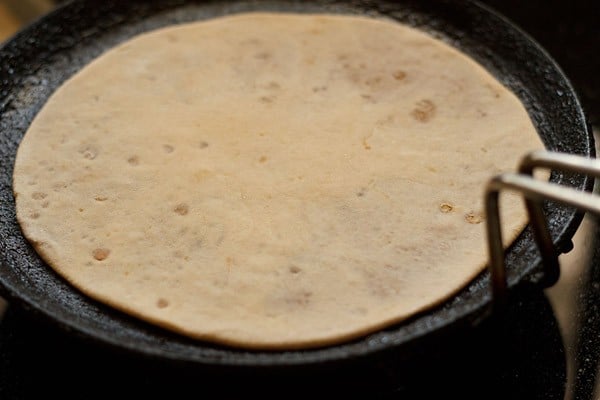
17. When one side gets browned, turn over and cook the other side till you see some brown spots.
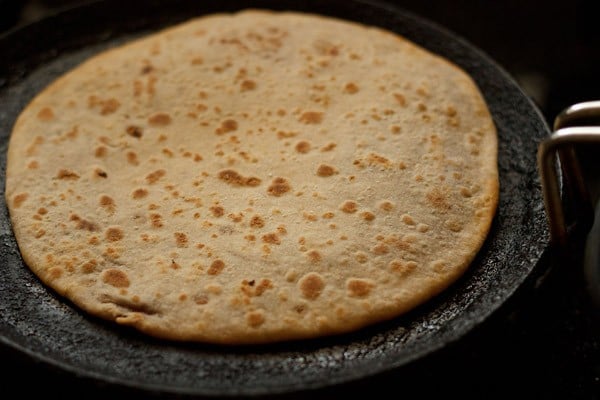
18. Once the second side is brown, turn over and apply ghee. If everything is done properly then puran poli will puff up.
Make all pooran poli this way and stack them in a casserole or in a kitchen napkin.
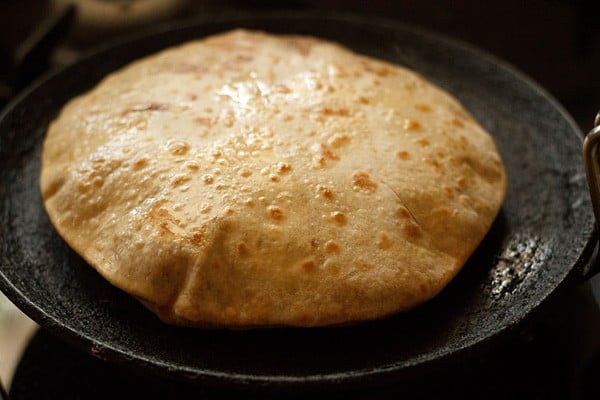
19. You can serve puran poli warm or at room temperature with milk, ghee or curd (yogurt). Enjoy!
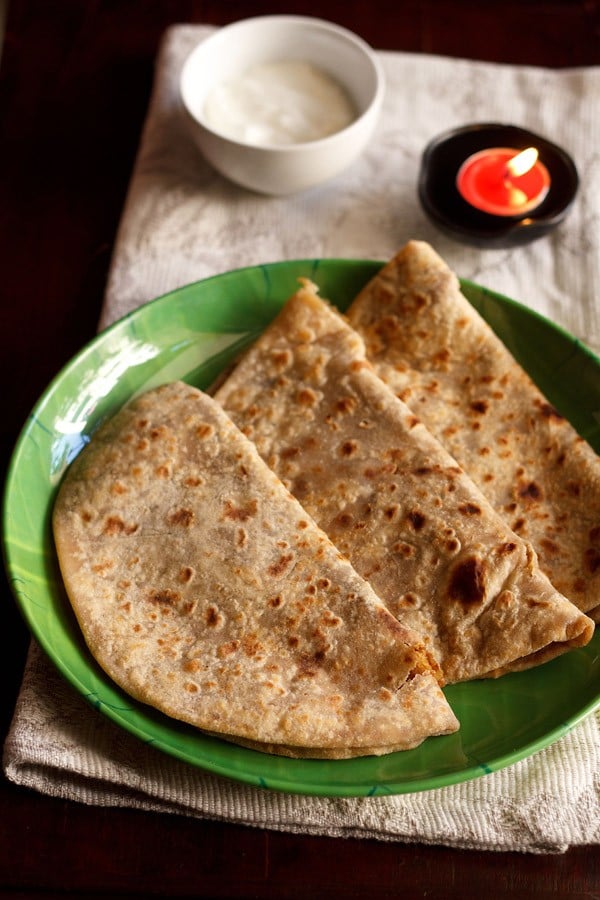
Expert Tips
- You can cook the lentils in a pot or pan, stovetop pressure cooker or an Instant Pot. If cooking lentils in a pot on the stovetop, then ensure to soak them for an hour or two.
- Use the leftover stock for making katachi amti (Maharashtrian style thin spiced dal) or you can even use it in your other vegetable dishes and roti dough or to make soups.
- Make sure to mash the puran mixture very well. If not done so, the whole pieces of lentils may cause the dough to crack or tear while rolling. To mash, you can use a potato masher, strainer or the typical equipment ‘puran yantra,’ which is similar to a food mill in America.
- Instead of whole wheat flour (atta), you can also make the dough with all-purpose flour (maida) or half-half of both the flours. Or opt to use whole wheat flour entirely.
- While rolling the Puran Poli, be careful. If it breaks or tears a little, then no issues. Just add some dry flour to that part and gently roll. When making for the first time, it may break. But that should not stop you from making. With practice, one gets better.
- The color of the Puran Poli will vary with the color of the jaggery used.
- You can make these Maharashtrian sweet flatbreads ahead of time and refrigerate to keep well for up to a week. You can also freeze them by separating cooked ones with sheets of parchment paper. Then, place these in an air-tight container and freeze for up to a month. Reheat by placing them on warm ghee on a tawa or griddle.
- Make vegan Puran Poli recipe by swapping ghee with a neutral tasting oil like vegetable oil, grapeseed oil or sunflower oil.
FAQs
Can I make these ahead of time?
Absolutely! They will last for up to a week in the refrigerator.
Can they be frozen?
Yes! Cooked puran poli can be separated with sheets of parchment paper, placed in an airtight container and frozen for up to 1 month. To reheat, simply warm some ghee on the tawa and griddle them until warmed through.
Can I make these vegan?
Sure! Simply swap in a neutral flavored oil for the ghee. I recommend vegetable oil or grapeseed oil or sunflower oil.
How much filling should I use?
I’d say the proportions should be roughly 1:1 for the amount of dough and filling used.
Step by Step Photo Guide Above
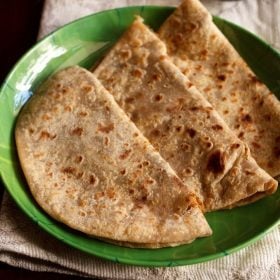
Ingredients
For puran mixture – sweet filling
- 1 cup chana dal (skinned split bengal gram)
- 3 cups water – for pressure cooking the chana dal
- 2 teaspoons Ghee
- 1 teaspoon fennel powder (ground fennel)
- ¾ to 1 teaspoon dry ginger powder (ground ginger)
- ½ teaspoon green cardamom powder (ground cardamom)or seeds from 4 to 5 green cardamoms crushed finely in mortar
- ¼ teaspoon nutmeg powder (ground nutmeg)
- 1 cup jaggery powder or 1 cup grated jaggery
for the poli – outer covering
- 1.5 cups whole wheat flour
- ½ cup all-purpose flour
- 4 tablespoons oil or ghee (clarified butter)
- ½ teaspoon salt or as required
- ¼ teaspoon turmeric powder (optional – to give a faint yellow color to the poli)
- water as required to knead the dough
- oil or ghee, as required for roasting the puran poli
Instructions
Preparing Puran (sweet lentil filling)
- Rinse the chana dal first very well in water. I didn’t soaked the chana dal but you can also soak the chana dal for 30 minutes to one hour and then drain the water.
- In a 3 litre stovetop pressure cooker, cook the chana dal with 3 cups water for 6 to 7 whistles on medium heat.
- The dal has to be cooked well. If you soak the chana dal, the cooking time will be reduced. Once the pressure settles down on its own in the cooker, then only open the lid. Carefully strain the cooked dal using a sieve. Drain all the water or stock from dal.
- Keep the stock aside. This stock can be used for making Katachi Amti which is a thin tempered dal or you can just add it to your everyday cooking of roti, rice or vegetables.
- Heat ghee in a frying pan or kadai (wok) and add the ground ginger powder, ground nutmeg powder, ground cardamom powder and ground fennel powder.
- Fry these ground spices for a few seconds on a low heat.
- Add the chana dal and jaggery. Stir and let this puran mixture cook on a low heat till the mixture becomes dry.
- Keep on stirring the puran mixture at intervals.
- Once the puran stuffing become dry and thick, switch off the heat.
- Let it cool and then mash the puran mixture with a potato masher. You can also use your mixer to mash the puran mixture very well. Set aside.You could also use puran yantra if you have it.
Preparing the poli dough
- Meanwhile take whole wheat flour, all purpose flour and salt in a bowl mix well.
- Add a little bit of water and ghee and mix. Begin to knead the dough adding water as needed.
- The dough should be smooth, supple and soft. Cover and keep aside the dough to rest for 15 to 20 minutes.
Making puran poli
- Take a medium or large size ball from the dough. Roll it 2 to 3 inches in circumference on a dusted rolling board.
- Place a portion of puran mixture in the center of the rolled dough.
- Bring the edges together towards the center. Join all the edges and pinch them.
- Sprinkle some flour and start rolling the dough.
- Make a medium or large circle (poli) as depending upon the size of the dough and puran filling you took.
- On a heated tawa or griddle, spread some ghee. Place the rolled poli/dough circle on the tawa.
- When one side gets browned, turn over and cook the other side till you see some brown spots.
- Once the second side gets browned, then turn over and apply ghee. If everything is done properly then puran poli will puff up. The poli should be cooked well with brown spots and golden.
- Make all puran polis this way and stack them in a casserole or roti basket or in a kitchen napkin.
- You can serve Puran Poli warm or at room temperature with milk, ghee or curd (yogurt).
Notes
- While rolling the puran poli, be careful. If it breaks a little, then no issues. Just add some dry flour to that part and continue to roll. When making for the first time, the pooran poli may break. But that should not stop you from making puran poli. With practice, one gets better.
- Instead of whole wheat flour, you can also make the dough with all purpose flour or half-half of both the flours. Or opt to use whole wheat flour entirely.
- Remember to knead the dough really well. It should be soft, supple and pliable. Add water as needed to get a soft dough.
- The color of the puran poli will vary with the color of jaggery used.
- The recipe is scaleable and you can easily make a small batch or a large batch.
Nutrition
This Puran Poli recipe from the archives first published on September 2012 has been republished and updated on March 2023.

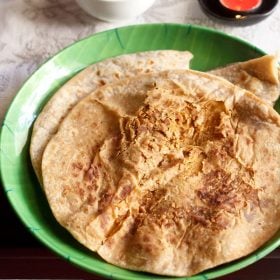
I’d agree that I was not a fan of puran poli, until i stumbled upon this recipe. Now, I love it!
Wow! Just Amazing.
Thank you Dassana for a such perfect and easy to understand recipe. I now make it every week!! I keep the dough and puran separate and use it to make a quick snack/breakfast/a small treat after lunch. I didn’t have ginger powder (we’re in lockdown here and couldn’t go to the Indian store to buy it) and have been making it without it. I also use a little turmeric as that is how I remember eating them at home as a kid.
Thanks a lot Nivedita. Glad to read your comment. Yes turmeric can be added. Even I add turmeric at times. Thanks again.
Excellent recipe, Easy to follow, Time consuming though as I had to make the ginger powder too, but loved the Puran polis.
Thank you for the feedback and the rating. Glad that you liked the recipe. Yes it does take time though.
Love your recipe,s Dassana. Thanks for sharing it. I do visit your site for quick reference during festive times too.
Love yr recipes.Thank u so much.Will try them.Will try Puran Poli for sure.god bless.
Step by step process ít really helps to learn the receipe perfectly *****
thanks for the feedback vanishree on the step by step format.
Very nice and easy explanation. I follow ur recipes and I get very good results, my family loved and very happy whatever I made by following u. Thanku very much.
thank you suchitra. so nice to hear your comment. most welcome and happy cooking.
Hi Mam I m big fan of your recipes and I tried almost all paneer recipes your step-by-step photos and information really helps me a lot. Keep posting new recipes..
thanks a lot. happy cooking.
Can we take puran poli for long distance travel.i mean kneading flour in milk.will it stay soft for long time
Sam, you can take. If you want to take for long distance then don’t add milk.
Hi Dassana
Thanks for the recipe and the step by step pictures to guide along. I have a question for you. I am in Canada. I want to invite a big group of friends and make puran poli. I need to make a batch of 50 puran polis. So how much quantity of ingredients should I use? Also can I make the puranpolis one day before & keep them ready?
aisha, you can easily make puran polis a day in advance. this recipe gives about 6 large sized puran polis. so for 50 polis, you will need to increase the proportion by 9 times. in a recipe like puran poli, the ingredients can be easily reduced or increased.
Hi dassana,
Tried making puran poli last night and came out so well. Thank you so much for your recipes. I am a big follower of your website. Love all the maharastrian dishes.
Thank you once again ????
Welcome Nisha. Nice to know that puran poli came out well. Thanks for your kind words.
Hi Dassana
When I boiled the dal , it became mushy. Can you tell how to get desired doneness of dal?
Moreover the puran poll was awesome. Made for breakfast. Perfect recipe with perfect illustrations.thanks a zillion. God bless u
thank you reetika for this feedback as well as your kind wishes. the cooking time of the dal depends on the quality of dal. so chana dal does take 4 to 6 whistles if not soaked before to get it almost cooked. so you can reduce the time when cooking next time. alternatively you can also cook in a pan as here then you can see when the dal is cooking and its easier to get the right doneness.
Hello mam, I jst wantd to ask u dat can we add some dry fruits(cashew nuts,almonds, pistachios) in d filling to make it more delicious…
anjali, you can add but you have to chop them very finely. otherwise dry fruits can come out of puran poli.
hi dassana , excellent recipe and taste …
rgds
thanks marina for positive views 🙂
Hi dassana, I had made puran look for the first time and it came out very nice.. did not make any mistakes… also tried your masala bhaat and amti dal… everyone liked it… thanks for sharing…
Regards n tk care
Marina
welcome always marina, thanks for positive views.
I made it for the first time and it came out superb.
thanks jaya for positive feedback 🙂
Hello mam ,
My whole family loved your recipes and all comes out awesome .
Thanks a lot
welcome kabita. glad to know this.
hi Dassana, this recipe worked out perfect! the puran polis turned out awesome, many thanks to you!
welcome ramya. glad to know this.
Hi,I have time and again tried and made many of your recipes… And every time it has come out awesome.. Thank you so so much
welcome roopa and thanks for positive feedback 🙂
Awesome website and recipes. Keep recommending you to my friends. Keep up the good work
thankyou so much padmini now we know where we are getting the traffic from 😉
I followed d recipe but my filling remained more like a powder than becoming a solid lump… What did I probably do wrong??
was the dal cooked well. the dal should be cooked till soft. powdery consistency can also be due to the quality of jaggery. just melt some jaggery and add and the mixture will be moist.
Yes d dal was cooked well… Cud be coz of jaggery
could be due to the jaggery. for puran poli its always good to use the brown colored jaggery.
This is exactly the procedure which we follow, though we soak the dough in oil. Also, while preparing the dough, my mom first mixes haldi with a little milk of lime and then adds atta(we use only atta and no maida), thoroughly mixes it and then kneads into a dough. Soaks the dough in oil for about 3 to 4 hours before preparing the polis. However, while frying the polis on tawa, we don’t use any any oil.
thanks sirisha for sharing with me the method of preparing puran poli by your mom. what is little milk of lime? or did you mean little milk or lime? since the dough is soaked in oil, i don’t think there is any need to fry the poli without adding any oil. makes sense the way your mom prepares the puran polis. just curious in how much oil do you soak the dough.
Milk of lime – the clear water of choona(the one we use for paan). Usually she spreads the dough in a flat bowl and completely covers it with oil. After 3 to 4 hours, she drains the complete oil out and then uses the dough to prepare the polis. She would drain out the exact amount of oil she used to soak :). So, it’s like though you soak it in oil, you still don’t use much oil at all.
fine. i thought so that it would be milk of lime, but just wanted to be doubly sure, hence asked you. the oil soaking part is done so well by your mother. kudos to her 🙂
In Trinidad we call this Dhal puri… Its made with alot more spices including ground geera and hot chill peppers as well as some chive and thyme, we leave out the jaggery and make it into a more savory dish.
thanks ashvini for sharing the trinidad version and name of the recipe. sounds delish.
Woww..Wowww…wowww…First of all let me tell you what a Greatttttt cook you are…!!!!Love all ur recipes..So simple to follow with beautiful step by step illustrations….
thankyou so much anshu 🙂
Hi Dassana,
Thanks for the yummy recipe. I tried it and found out that the puran is not sweet enough for our taste. What should i do to make it sweeeter after it is cooked? should i just add more jaggery to it and heat for some time? please advise.
Yes add some more jaggery and cook it for few minutes.
nice explaination i vill try soon
hi Dassana
this is so good. we make this in Andhra but its complete maida and uses so much ghee, this is perfect. thanks for the recipe..:) love ur pictures and details…
welcome manasa. thanks for your positive feedback.
Awesome website… Let me tell you, I always follow this website to try ny new dishes… Steps given very clearly.. Thanks so much.. Hope to get lot more new and interesting stuff ..
welcome sheetal. glad to know this. thanks for sharing positive feedback.
Thank you for this great recipe! Its so good that Ive just HAD to make it three times this week 😀 with the katachi amti and rice yum yum yum… Im no cook, but the step by step method is so clear and great, this is the blog site i turn to when i need a recipe. Thank you so much for all the time and effort you go into to put up these recipes online! Love, san
welcome san. glad to know that you liked the recipe. thanks for sharing your positive feedback.
I made this today. This was my second attempt as my kid loves it. The first time I tried some other recipe and it flopped out. But today, everybody at home loved this. Thanks. Your recipe is so self explanatory and the pics help. Also I have made the baked samosas often. Thank you….and God bless u for helping us who would love to cook but really need a guiding hand.
Cheers
welcome elizabeth. thanks for sharing your positive feedback on recipes and for your prayers.
Hi,
Thanks for sharing this lovely recipe. I made this yesterday. If you remember I had asked you whether I could use Sugar. I am sorry but, I used sugar , inspite you telling me not to..I added around 5-6 spoons. It didn’t turn up sticky. It came out nice. Of course since I made it for the first time, it was a bit out of shape..but, it was nice. My husband loved it and was surprised that I made it. I have tried/ will keep trying your other recipes..They are really Lovely & tasty..I can’t thank you enough for posting such lovely and mouth watering recipes..Keep posting 🙂
welcome pooja. no need to be sorry. i didn’t suggested sugar because sugar has to be cooked to a correct consistency and most novice cooks may not be able to do it. but i am glad to know that you managed successfully. you can also try the sugar paratha recipe posted in the blog.
Hi,
I have tried making puran poli a couple of times but, have always turned a disaster. I have tried your other recipes & they were loved by my kids. I am definitely going to try this..just one question..can I add sugar say 1 cup along with the jaggery? Will it make the puran sticky?
thanks pooja. glad to know this. sugar might make the puran poli sticky. i would suggest to use jaggery only.
I made it..I really can’t thank you enough..Tomorrow I am going to try the bhindi masala gravy one.. & I am very sure that It will also be super duper hit…I am waiting for your “Narali bhaat “recipe which the Maharashtrians make..
welcome pooja. i will try to add narali bhaat recipe soon. however there is a huge list of requested recipes.
Hi
Thankyou so much for this recipe. I tried it today and it was fantastic!! just like my mom’s 🙂
welcome disha. glad to know this.
Hi Dear… I wanted to comment on this website since long time… I am not really good at cooking… however I love cooking and these days whenever I want to make any Indian dish, I first come to your blog and check the recipe… I really love the way you write the recipes… with all the pictures.. I have tried Chole, Puran poli, Dum biryani, veg pulav, lauki kofta and lot of more recipes… All of them turned out well.. some of them really well.. Thanks for such a nice blog and keep up good work…
Thanks a lot Tejashri for sharing positive reviews on the recipes you tried. Good to know that you are liking cooking these days.
Lovely receipes and the method of explaining is excellent that too. With pictures
thanks aarti
Really.. awesome way of describing recipes..i have gone through many other sites, but this one is just perfect..
thanks sunita for this positive feedback on recipes.
Thankyou loved ur step by step picture presentation.
welcome rubina
Hi Dassana commenting after long time as ur maid helped u with some tips on making puran polis so did my maid teach me to make it as my MIL doesnt have interest in cooking and my husband loved puran polis and before marriage I had never made it so I had to learn it by hook or by crook(as I wanted my husband to get closer to me & as MIL did not know cooking that was my trump card) and now I make them her well but now I am definitely going to try this one thanks a lot.
welcome back theresa. i understand your situation. do try this recipe too and see if it works for you.
Thankyou so much….with alll ur recepies and lovely pics I feel successful. …..I have won the world with ur foodviva
thanks jatin for this feedback filled with positive energy.
This was a hit !!
Thanks for making home cooking so interesting ,when we want to eat something easy and different for dinner , I always turn to your blog …Have tried several recipes from your blog and they always turn out great.
Love your step-by step recipes !
welcome samyuktha and big thanks for these motivating words. nice to know that you have already tried many recipes from the blog and they all turned out good. keep visiting.
the recipie was wonderful and step wise ecellent
thanks sobiya
i love puran poli.. making it has become clear now.. lovely clicks..:)
You are on a roll girl !! 🙂
Hi Dassana,
I’ve been looking for a simple and healthy obattu recipe; and this fits the bill perfectly. Your step by step pics are superb. Few questions…
1 – I too buy the powdered organic jaggery, but generally boil and sieve…is that not required here? If i use the sieved liquid jaggery here, would it work… please suggest
2 – Can i make the filling and freeze or refrigerate for later use? Is it advisable?
Thanks again… i am a fan of your blog.
hi ida. your queries answered below:
1: i have never seen any impurity in the organic jaggery i buy, thats why i don’t melt and then sieve the solution.
2: i am not sure how the filling will behave if its freezed and then thawed. but you can refrigerate for a day or two.
My puran poli was a hit Dasana.Thank u for recipe.
The puranpoli came out hard. What mistake am I making?
what was hard? the outer poli or the inner filling. let me know.
these are great. There are a few different versions of puran poli, I’ve tried a some but not this one. Would love to try this out.
I’ve never had puran poli before. But LOVE stuffed parathas 😀
With your step by step pics it is now a must try for me….
Puran poli looks super yum…Loved the filling and the addition of ginger powder to it…Never made these at home but have eaten a lot from friends house…:) Lovely clicks..
Lovely recipe will surely make this Obattu in Kanada as Puran poli in Marati.
I like puran poli a lot…never tried.
hi, thx for ds recepie. but need mawa modak recipe urgently,kindly help. also maida covering wala modak, thx
dear vandana.. by the maida flour covering you mean the fried modak, i hope.
for the outer covering – take 2 cups of flour with salt, add 1 or 2 tbsp of hot or warm oil to the flour. mix well. add water and knead into a smooth dough.
for the mawa filling – in a kadai, take the mava, sugar and cook it till it becomes semi dry.add dry fruits and cardamom powder. mix well. cool and then stuff in the maida covering. for the consistency of mava, you can have a look at the recipe of gujiya made with apples – apple gujiya
I really enjoyed the step by step pictures. My friend makes homemade chapati and I’ve seen how she makes it but that one is regular one and not including filling. This is so fun and delicious… very special bread and wish to have some!
Love channa daal puran polis….what kind of jaggery do you use?
dear sanjeeta, i use organic jaggery which comes in powdered form from fabindia…
I think this is tasty so I’m going to try this. pls let me know is this can prepare in savory taste. if can what are the ingredients…
dear aruni, in our home, we do make a savory filling of the chana dal and we call these chana dal paratha. here we don’t mash the chana dal. just cook them with separate grains, but wholly cooked… then add some green chilies, salt, garam masala powder. mix well and stuff the filling into the paratha… fry in oil or ghee and serve hot.
Awesome filling….love it….puran poli looks extremely delectable…..
I love puran polis and they are called holiges in karnataka. They are a must in our weddings. This sends my taste buds drooling!
That looks delicious…my anytime fav snack…can actually have it anytime :))
Thanks Dassana for interesting recipes
Usually for Ganapati’s prasad we make five days five differnt types of Laddoos
So we offer Home made Prasad
Can you suggest anything which is easy to make
5 types of laddoos… wow 🙂
i know a few recipes that are both sweet and savory and made for the bhog or naivedyam for lord ganesha:
1: sweets: rava laddoo, besan laddoo, fried modaks. i assume you know how to make the laddoos… fried modaks i will be sharing soon on the blog.
2: savory: black peas curry, dal varan, rice flour pooris, rishi panchami bhaji or sabzi – these all are easy to make. you can just write to me for these recipes at vegrecipesofindia(AT)gmail(DOT)com and i will share with you how they are made.
Puran poli is my fav and love to eat it with sukhi bhaji and guj kadhi. my husband doesn’t like it that much, so after marriage I don’t get chance to have puran polis that often, but he is out of town for a week. and thinking to make this and your delicious photos and post made my decision strong. my mom used to add sugar in it. but i will try to add jaggery like yours.
thankfully at home everyone likes puran poli. do make these ones. you can add sugar too, but the jaggery stuffing is much much better & tastier.
You are just amazing……..i luv puranpoli but did knew the recepie & wanted to know eagerly ……… all thanx to you for posting this recipie:-):-):-)
thanks muskaan and do make this recipe…
Looks yum…great using wheat flour …wish I can have it 🙂
I think I will make this for Ganesh Chaturthi this year. Need a change from the usual payasam that I make. Very nicely shown. I might use a mix of wheat flour and maida for the colour – more because I would share it with the neighbour!
Thats a wonderful preparation,we make a similar version of Holige in Karnataka and I just love it
thanks pratibha. i know about holige and it is prepared in a similar way. had the opportunity in bangalore to have some delicious holige in an aunty’s place during varalaxmi pooja.
tks dasanna.i hav tried ur recipes and they are wonderful n tasty,i m improving my cooking a little by little by following ur way a in cooking indian food,puran poli looks very good ,i will tryto do it.thanks o lot.thavamani
thanks thavamani and do try the puran poli.
very interesting… My MIL always makes it with maida so this is so much healthier.
Looks delicious, loved the step by step presentation for the recipes 🙂
Hi Dassana,
Wow, I love this recipe! Indian food is just so amazing and there is always something new to try. Thanks for sharing:)
Puran poli has to be one of my favorite Indian sweet. In the summer, I visited India and brought some back for my husband and friends to enjoy this.
So glad you posted this recipe. Will try it out soon!
Yum. Your pictures are really well done–they make me feel like I could do this even though I am pretty hopeless at rolling dough out!
Dassana, this was a feast for the eyes.
I tried this n jus loved it… n ur blog I’d so attractive n simplified..
thanks manisha.